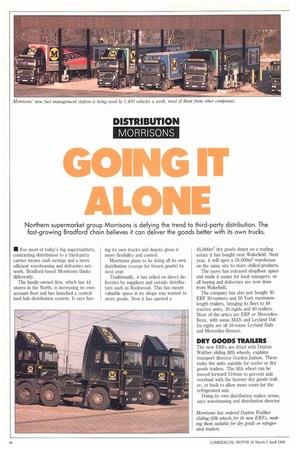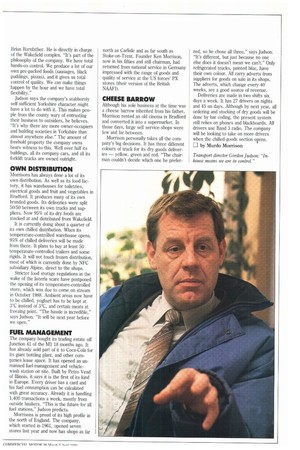GOING IT ALONE
Page 48

Page 49

If you've noticed an error in this article please click here to report it so we can fix it.
Northern supermarket group Morrisons is defying the trend to third-party distribution. The fast-growing Bradford chain believes it can deliver the goods better with its own trucks.
• For most of today's big supermarkets, contracting distribution to a third-party carrier means cash savings and a more efficient warehousing and deliveries network. Bradford-based Morrisons thinks differently.
The family-owned firm, which has 44 stores in the North, is increasing its ownaccount fleet and has launched a centralised hub distribution system. It says hav ing its own trucks and depots gives it more flexibility and control.
Morrisons plans to be doing all its own distribution (except for frozen goods) by next year.
Traditionally, it has relied on direct deliveries by suppliers and outside distributors such as Rockwood. This has meant valuable space in its shops was wasted to store goods. Now it has opened a
45,000m2 dry goods depot on a trading estate it has bought near Wakefield. Next year, it will open a 28,000m2 warehouse on the same site to store chilled products.
The move has released shopfloor space and made it easier for local managers, as all buying and deliveries are now done from Wakefield.
The company has also just bought 30 ERF 30-tonners and 50 York maximumlength trailers, bringing its fleet to 48 tractive units, 20 rigids and 80 trailers. Most of the artics are ERF or MercedesBenz, with some MAN and Leyland Daf. Its rigids are all 16-tonne Leyland Dafs and Mercedes-Benzes.
DRY GOODS TRAILERS
The new ERFs are fated with Dayton Walther sliding fifth wheels, explains transport director Gordon Judson. These make the units suitable for reefer or dry goods trailers. The fifth wheel can be moved forward 510mm to prevent axle overload with the heavier dry goods trailer, or back to allow more room for the refrigerated unit.
Doing its own distribution makes sense, says warehousing and distribution director Brian Bamfather. He is directly in charge of the Wakefield complex. "It's part of the philosophy of the company. We have total hands-on control. We produce a lot of our own pre-packed foods (sausages, black puddings, pizzas), and it gives us total control of quality. We can make things happen by the hour and we have total flexibility."
Judson says the company's stubbornly self-sufficient Yorkshire character might have a lot to do with it. This makes people from the county wary of entrusting their business to outsiders, he believes. "It's why there are more owner-occupiers and building societies in Yorkshire than almost anywhere else." The amount of freehold property the company owns bears witness to this. Well over half its buildings, all its company cars, and all its forklift trucks are owned outright.
OWN DISTRIBUTION
Morrisons has always done a lot of its own distribution. As well as its food factory, it has warehouses for toiletries, electrical goods and fruit and vegetables in Bradford. It produces many of its own branded goods. Its deliveries were split 50/50 between its own trucks and suppliers. Now 95% of its dry foods are stocked at and distributed from Wakefield.
It is currently doing about a quarter of its own chilled distribution. When its temperature-controlled warehouse opens, 95% of chilled deliveries will be made from there. It plans to buy at least 50 temperature-controlled trailers and some rigids. It will not touch frozen distribution, most of which is currently done by NFC subsidiary Alpine, direct to the shops.
Stricter food storage regulations in the wake of the listeria scare have postponed the opening of its temperature-controlled store, which was due to come on stream in October 1988. Ambient areas now have to be chilled, yoghurt has to be kept at 3°C instead of 5°C, and certain meats at freezing point. "The hassle is incredible," says Judson. "It will be next year before we open."
FUEL MANAGEMENT
The company bought its trading estate off Junction 41 of the M1 18 months ago. It has already sold part of it to Coca-Cola for its giant bottling plant, and other companies lease space. It has opened an unmanned fuel-management and vehiclewash station on site. Built by Petro Vend of Illinois, it says it is the first of its kind in Europe. Every driver has a card and his fuel consumption can be calculated with great accuracy. Already it is handling 1,400 transactions a week, mostly from outside hauliers. "This is the future for all fuel stations," Judson predicts.
Morrisons is proud of its high profile in the north of England. The company, which started in 1981, opened seven stores last year and now has shops as far north as Carlisle and as far south as Stoke-on-Trent. Founder Ken Morrison, now in his fifties and still chairman, had returned from national service in Germany impressed with the range of goods and quality of service at the US forces' PX stores (their version of the British NAAFI).
CHEESE BARROW
Although his sole business at the time was a cheese barrow inherited from his father, Morrison rented an old cinema in Bradford and converted it into a supermarket. In those days, large self service-shops were few and far between.
Morrison personally takes all the company's big decisions. It has three different colours of truck for its dry goods deliveries — yellow, green and red. "The chairman couldn't decide which one he prefer red, so he chose all three," says Judson. "It's different, but just because no one else does it doesn't mean we can't." Only refrigerated trucks, painted blue, have their own colour. All carry adverts from suppliers for goods on sale in its shops. The adverts, which change every 40 weeks, are a good source of revenue.
Deliveries are made in two shifts six days a week. It has 27 drivers on nights and 45 on days. Although by next year, all ordering and stocking of dry goods will be done by bar coding, the present system still relies on phones and blackboards. All drivers use Band 3 radio. The company will be looking to take on more drivers when the chilled-goods section orns.
CI by Murdo Morrison








































































































































